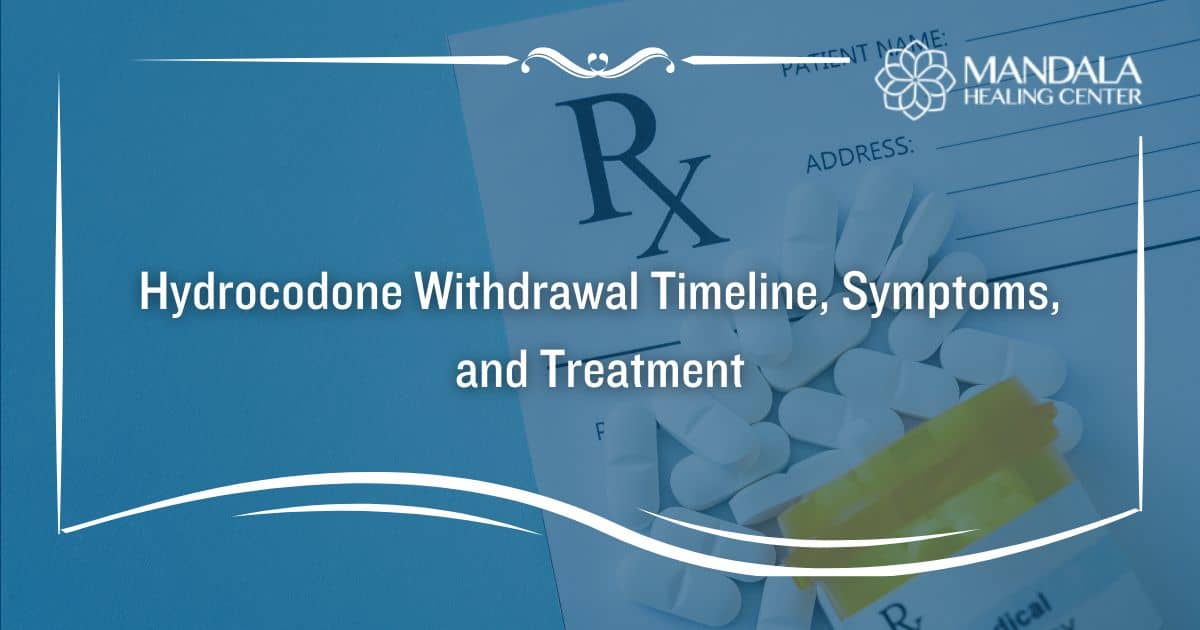Hydrocodone is an addictive opioid drug that is an active ingredient in several prescription pain relievers, including Vicodin. Hydrocodone use is common in the United States–in fact, medications including this potent opioid are the most commonly-prescribed drugs in the country.
Prescription medications that contain hydrocodone can help people manage pain after surgeries, medical procedures, or chronic health conditions or recurrent pain. But people who take hydrocodone for an extended period or misuse it may develop dependence or addiction to the drugs. The severity and timeline of hydrocodone withdrawal can vary from one person to the next, but it usually isn’t life-threatening and lasts for about one week.
Because the medication is so common, many people may assume this drug is safe. However, the risks of hydrocodone misuse are high, even among people who take it as prescribed. People who use hydrocodone must understand the risks this medication poses and seek help for dependence or addiction.
If you or someone in your life needs support and treatment to overcome hydrocodone abuse or addiction, contact the specialists at the Mandala Healing Center to explore your treatment options.
Hydrocodone Dependence
Misusing hydrocodone means using it in a way that is different than your doctor prescribed–or using it without a prescription. People who misuse hydrocodone may take higher doses, take it more often, or take it longer than their doctor advised.
Hydrocodone abuse is often recognizable to others. Some of the signs of hydrocodone abuse include:[1]
- Slowed heart rate
- Depressed breathing
- Feelings of anxiety or fear
- Depression
Over time, people may develop tolerance, meaning they need to take more of the drug to get the desired effects. People who abuse hydrocodone may “doctor shop,” meaning they have multiple prescriptions from different doctors.
Another symptom of hydrocodone dependence is a person experiencing withdrawal symptoms, including intense cravings, if they suddenly stop taking the drug.
Hydrocodone Withdrawal
Opiates work by binding to opioid receptors throughout a person’s body. They slow down the activity of several bodily systems. Users may experience reduced body temperature, slowed breathing, reduced heart rate, and lower blood pressure. With regular use, a person’s body may adapt to the presence of hydrocodone. If that person suddenly stops using hydrocodone, they will likely experience a range of uncomfortable–sometimes dangerous–withdrawal symptoms.[2]
Hydrocodone withdrawal symptoms include:
- Muscle aches
- Watery eyes
- Runny nose
- Sweating
- Chills with goosebumps
- Yawning
- Nausea, abdominal cramps, vomiting, and diarrhea
- Headache
- Mood swings and irritability
- Agitation
- Depression
- Inability to concentrate or focus
- Insomnia
People may also experience serious side effects like suicidal thoughts, high blood pressure, and irregular heartbeat.
A person’s hydrocodone withdrawal symptoms can vary greatly based on the amount they use, other substance use, general health, and other factors.
Understanding the Hydrocodone Withdrawal Timeline
Knowing what to expect during each stage of hydrocodone withdrawal may keep you motivated when things are challenging and help you prepare for what will come next.
While many factors can affect the severity and length of your symptoms, here is an example of the typical hydrocodone withdrawal timeline.
6-12 hours
Most drugs containing hydrocodone are formulated for immediate release. The effects of hydrocodone typically last from 4 to 6 hours. For most, hydrocodone withdrawal symptoms begin within 6-12 hours of a person’s last dose of the drug.
12-72 hours
Withdrawal symptoms, including nausea, chills, muscle aches, and mood swings, begin to develop. Symptoms generally peak around the third day. The risk of relapse is high during this time, and supervision is essential to completing detox.
One week
For many, hydrocodone withdrawal symptoms may begin to ease toward the end of the first week. Physical symptoms may disappear, while emotional symptoms like depression or irritability may linger.
One month
Some people will continue to experience withdrawal symptoms like cravings, depression, restlessness, and insomnia for a month or more. People who took hydrocodone for a longer period may need more support to manage the effects of psychological addiction and require more time for their body and mind to rebalance.
Hydrocodone Withdrawal Treatment
A person who uses hydrocodone regularly and then abruptly stops taking it will likely experience uncomfortable withdrawal effects. It is often very challenging for people to detox from hydrocodone at home, and most people who try are unsuccessful.
Seeking treatment from a medically-supervised detox program is the most effective way to ensure you have a safe, complete detox from hydrocodone. Treatment from a supervised detox program includes:
- Medications like Suboxone, buprenorphine, and methadone to help you manage withdrawal symptoms
- Emotional support, including individual counseling when appropriate
- Holistic therapies like nutrition support, massage, and yoga to promote calm and comfort
- Round-the-clock supervision and distance from triggers
Many hydrocodone detox programs last 5 to 7 days but can be adjusted to meet each person’s needs. After a safe, complete detox, it’s essential to continue treatment in a comprehensive program to address the emotional, behavioral, and environmental aspects of addiction.
Find Help Now
If you or someone you love needs help to manage hydrocodone withdrawal, help is just a phone call away. Reach out to the specialists at the Mandala Healing Center today to explore our holistic treatment options. Don’t wait to begin your recovery journey. Take the first step toward a healthier future today.
References:
- National Library of Medicine: Hydrocodone, Retrieved June 2023 from https://www.ncbi.nlm.nih.gov/books/NBK537288/
- National Library of Medicine: Opioid Withdrawal, Retrieved June 2023 from https://www.ncbi.nlm.nih.gov/books/NBK526012/












